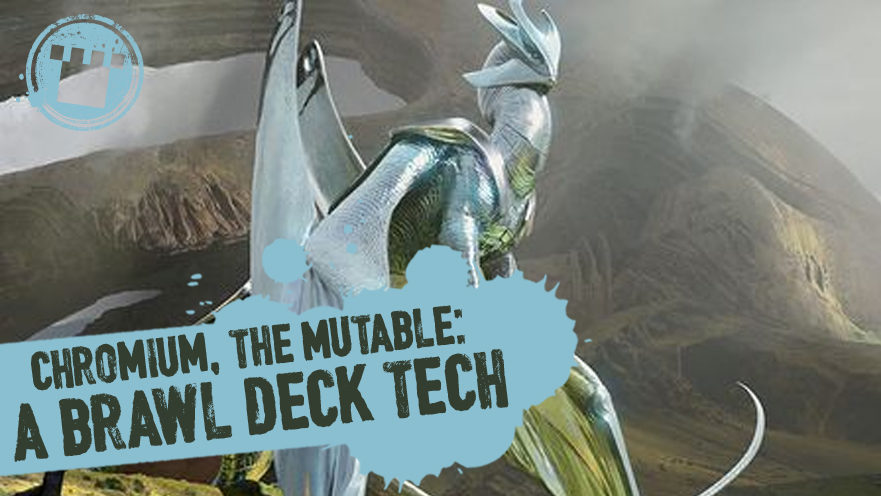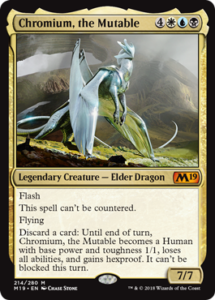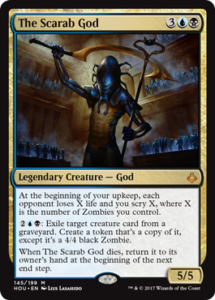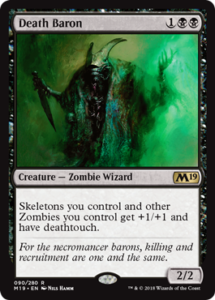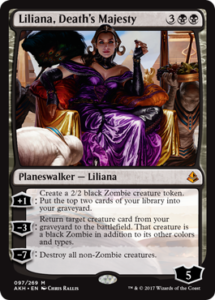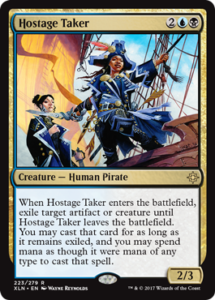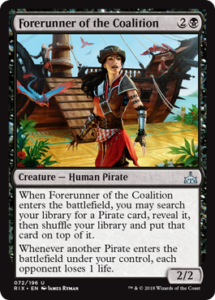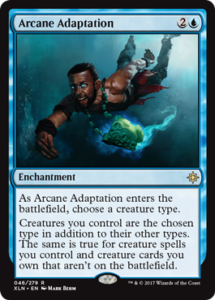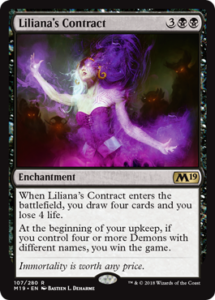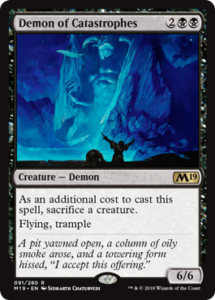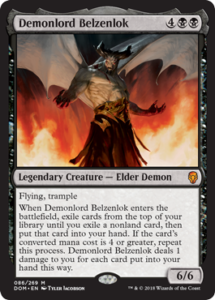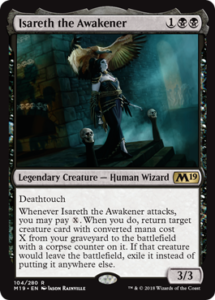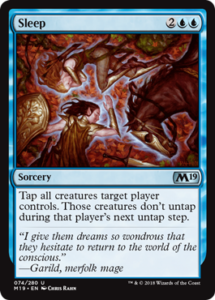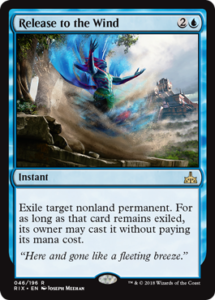Unlike every other shard, Standard hasn’t had a legendary Esper card since the days of actual Esper (Sen Triplets and Sharuum the Hegemon). For Brawlers, getting Chromium, the Mutable is the first opportunity to build an Esper deck, and it’s an interesting card to boot. While its flash, flying, and resistance to removal are best suited for a control deck – especially for two-player games – I’d like to use Chromium‘s mutability to walk down a different path.
I’ve long been a fan of decks that use cards like Conspiracy, Unnatural Selection, Xenograft, and Arcane Adaptation in unpredictable ways. I like having to make decisions with those cards based on the board state, as opposed to choosing the same creature type every time. And Core Set 2019 adds several tribal lords and other synergies to the Ixalan block, giving us a year’s worth of bizarre fun with the concept. I’ve built the deck in this article out of all current Brawl-legal sets, but there won’t be much to replace in October, leaving the weirdness intact.
CHROMIUM, THE MUTABLE – BRAWL
Commander
1 Chromium, the Mutable
Lands
2 Plains
6 Island
9 Swamp
1 Evolving Wilds
1 Meandering River
1 Glacial Fortress
1 Submerged Boneyard
1 Drowned Catacomb
1 Forsaken Sanctuary
1 Isolated Chapel
Creatures
1 Deadeye Tracker
1 Metallic Mimic
1 Daring Saboteur
1 Dire Fleet Poisoner
1 Fathom Fleet Captain
1 Timestream Navigator
1 Warkite Marauder
1 Death Baron
1 Forerunner of the Coalition
1 Isareth the Awakener
1 Mentor of the Meek
1 Sailor of Means
1 Tomb Robber
1 Deadeye Brawler
1 Demon of Catastrophes
1 Dreamcaller Siren
1 Hostage Taker
1 Pitiless Plunderer
1 Deadeye Plunderers
1 Dire Fleet Ravager
1 Prosperous Pirates
1 The Scarab God
1 Demonlord Belzenlok
Noncreatures
1 Liliana, Death’s Majesty
1 Arcane Adaptation
1 Liliana’s Contract
1 Open the Graves
1 Radiant Destiny
1 Manalith
1 Vanquisher’s Banner
1 March of the Drowned
1 Sleep
1 River’s Rebuke
1 Release to the Wind
1 Vona’s Hunger
Mostly, this deck is about Pirates who turn into Zombies, although sometimes Zombies turn into Pirates and sometimes Pirates and Zombies turn into Demons. What are the reasons for doing any of that?
Turning Pirates into Zombies
The bulk of this deck is blue-black Pirate tribal, as Pirates provide a creature curve that’s historically rare in the colors and make the occasional Treasure to ramp out Chromium. They’re small enough that Mentor of the Meek (oh, those meek Pirates) can draw lots of cards with them. It’s not like they’re all weak by themselves, either; Timestream Navigator, Hostage Taker, and Dire Fleet Ravager are all independently great in Brawl.
Core Set 2019 gives a critical mass of reasons to name Zombie with Arcane Adaptation and make our Pirate army a Zombie Pirate army. The Scarab God is the most obvious, as turning your existing board into Zombies results in a huge life loss/scry trigger. Liliana, Death’s Majesty can create Zombies, reanimate Pirates into Zombies, and destroy all non-Zombie creatures; Liliana enjoys her some undead Pirates. But it’s the welcome reprint of Death Baron that puts Zombie Pirates over the top. Several Pirates already have menace, and adding +1/+1 and deathtouch to them makes blocking a nightmare. (Dire Fleet Ravager natively has menace and deathtouch to show the others how it’s done.) Combined with Metallic Mimic, Radiant Destiny, and Vanquisher’s Banner, Zombie Pirates have four lords/anthems, and that’s plenty fearsome.
But occasionally you’ll want to go the other way…
Turning Zombies into Pirates
If you’ve played with Xathrid Necromancer, you know the power of making its Zombie tokens into Humans – you get a stream of unending (if malodorous) value. Core Set 2019 isn’t just reprinting Death Baron for Zombie fans; it’s also giving a Xathrid Necromancer-style card in Open the Graves. At five mana, Open the Graves is fair value at just three Zombies, and it’s likely to make more in a deck like this one where it tops the curve.
But what if those Zombies had other value? If Pirate has already been named for an anthem effect, those Zombies are 3/3’s. More to the point, Forerunner of the Coalition‘s life loss trigger gets out of hand if every dying nontoken Pirate turns into token Pirates thanks to Arcane Adaptation. On that board, opponents have to deal specifically with the Forerunner or else they have no good options. March of the Drowned‘s ability to return two Pirate creature cards from the graveyard looks a lot better when Arcane Adaptation has changed your entire graveyard into Pirates as well; have you ever wanted to pay one mana to recur Mentor of the Meek and Demonlord Belzenlok?
Speaking of Demons and options, it appears Liliana’s Contract is out of option clauses. That doesn’t mean we are, because if it shows up, you’ll want to be…
Turning Everything into Demons
Liliana’s Contract is a decent card draw spell that doubles as a win condition for having four Demons with different names. As soon as it was spoiled, loads of multiplayer aficionados went straight for Arcane Adaptation – and rightfully so. Two cards that combine in a singleton format into a win for having four nontoken creatures seems good.
Demon of Catastrophes and Demonlord Belzenlok are easily playable Demons; Razaketh the Foulblooded was too high on the curve for this deck, but it’s good, too. Archfiend of Ifnir and even Baleful Ammit are playable. But with only ten Demons available in Brawl, the Contract won’t win without Arcane Adaptation, and there aren’t other rewards for naming Demon. So, with Pirates and Zombies combining in a swarm, changing them all into Demons is a surprisingly straightforward win condition. With a commander that’s hard to kill and a high creature count, having four creatures on the board with different names is unlikely to be difficult, and if you haven’t used Arcane Adaptation to turn Pirates into Zombies or vice versa, this is a great way to win.
On rare occasions, you’ll want to name Human with an anthem effect (almost all the Pirates in this deck happen to be Humans, and pumping Isareth the Awakener, Mentor of the Meek, or small-fry Chromium, the Mutable might be relevant) or Skeleton with Arcane Adaptation (if Death Baron really needs to pump itself). Most of the time, Pirates, Zombies, and Demons are good enough, but I love that the decision on each effect is based on the board rather than a creature type you might as well scribble onto the card.
Other Notable Cards
Isareth the Awakener is another new card that seems like a fine mana sink at a good spot on the curve. A 3/3 deathtouch for three mana is also perfectly serviceable. I don’t know that you’d want Isareth in a deck that’s any slower than this one, but I like it here a lot.
I’m so happy Sleep is back, and this is the right kind of deck for it, as it can send in a few creatures at the Slept player while leaving others back.
Release to the Wind is mostly here to reset Arcane Adaptation as needed, but it also combines with anything Isareth has reanimated with a corpse counter. For the same reason that Whip of Erebos and Obzedat, Ghost Council were a hot item in Standard, Release to the Wind gets Isareth corpses out of the exile replacement effect, because that effect can’t replace exile that occurs for other reasons; plus, when Release to the Wind brings the card back, it’s a new object. That won’t come up often, but it’s nice to have. Release to the Wind also can reset Hostage Taker, make Chromium cheaper if it’s somehow dealt with, or deal with a token permanently; it earns its keep.
Conclusion
While this deck is based around Chromium in the same way that movies are based on true stories – vaguely, if you squint – it’s fun building with Esper both aggressively and with shenanigans. Combining everyone’s favorite Dragon-Human with a shifting mix of Pirates, Zombies, and Demons is the kind of thing fun, splashy multiplayer stories are made of – and it’s rare that Esper gets to be the fun in the story.

Brandon Isleib plays a lot of Commander and Brawl and loves finding the intersection of unusual and effective plays. He worked for Wizards of the Coast in 2014, he has put flavor text on a few cards, and he’s partly responsible for “create” being the word for cards making tokens. He is a legislation editor for the city of Seattle, he has written a baseball book, and he is proficient at making his bio sound more impressive than it is.

